名词与定从区别2
图片预览


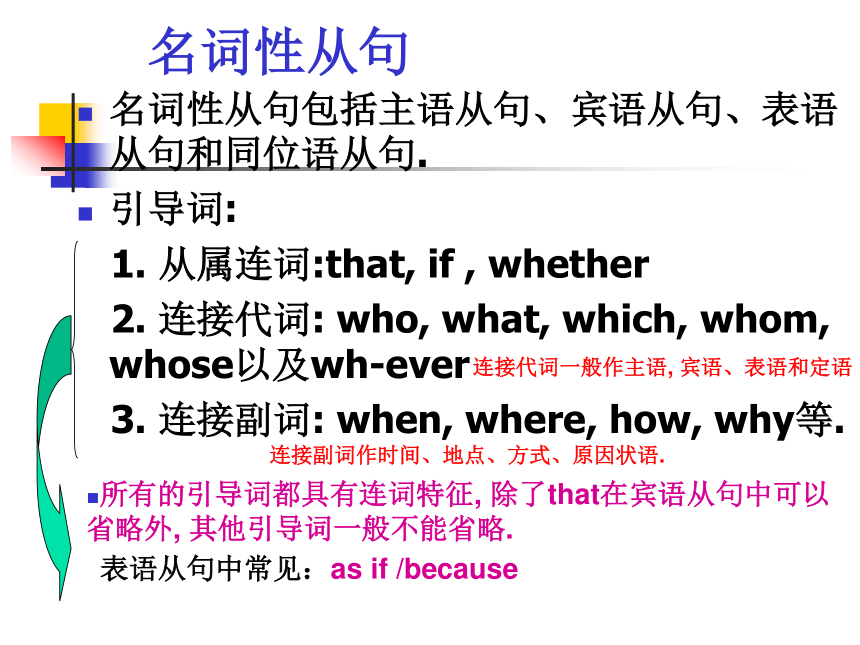
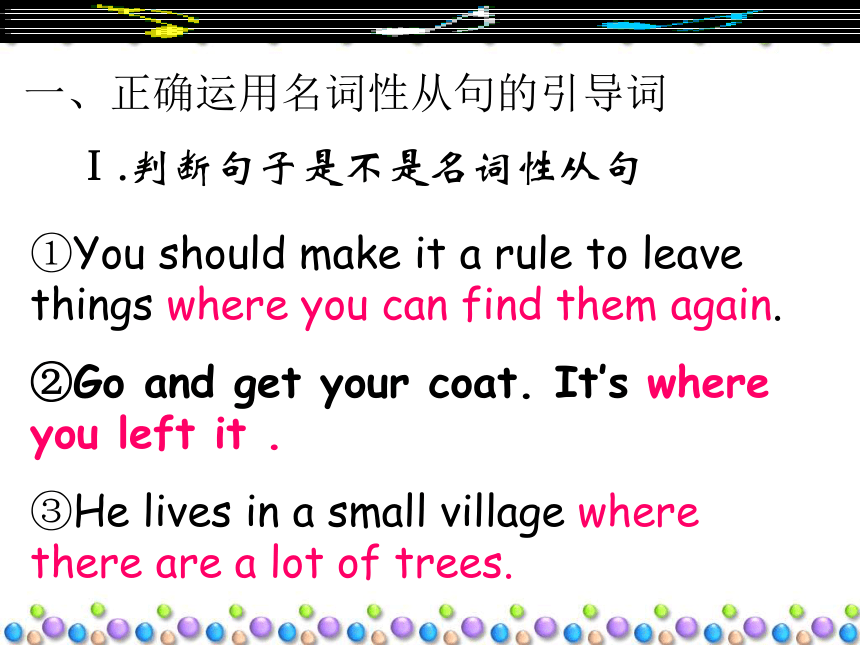
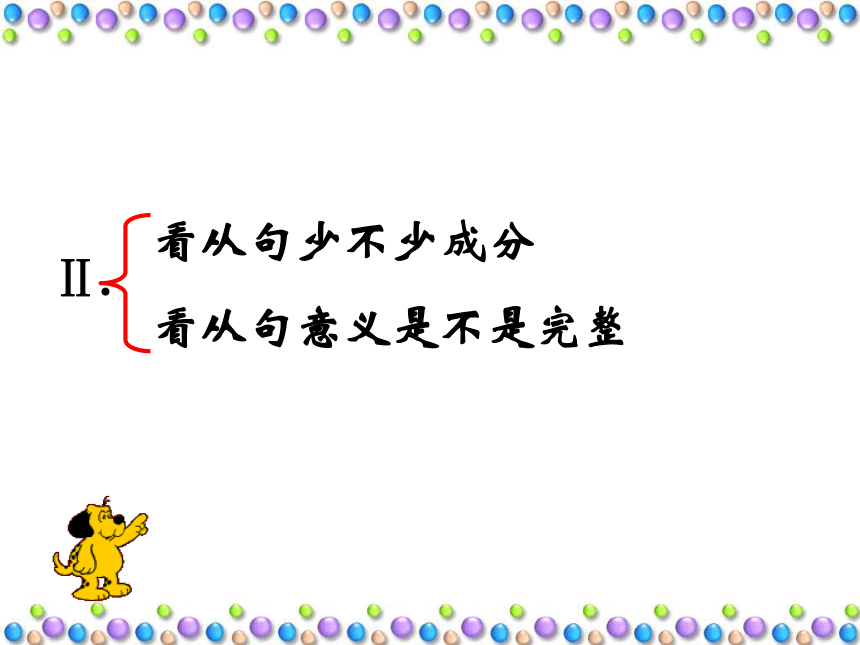
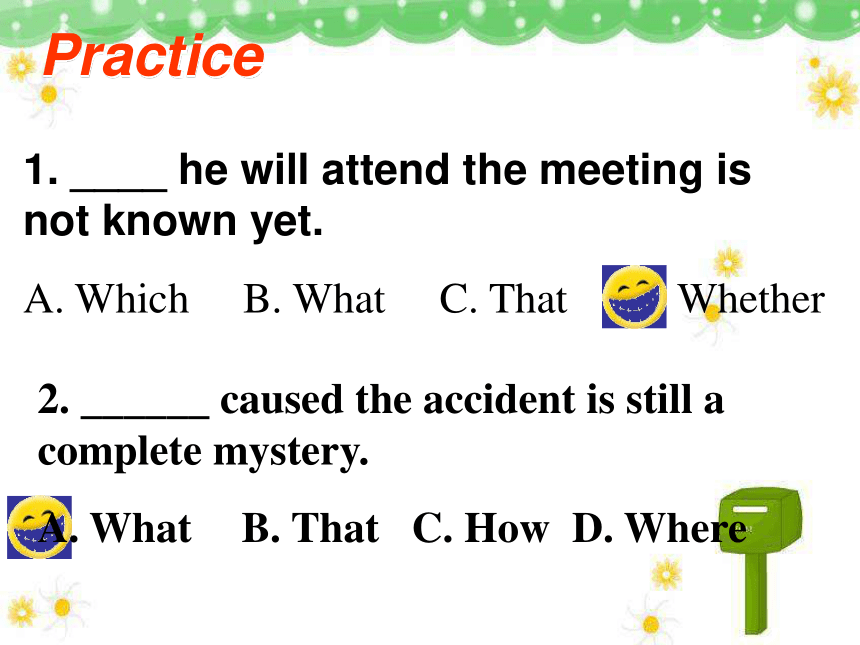
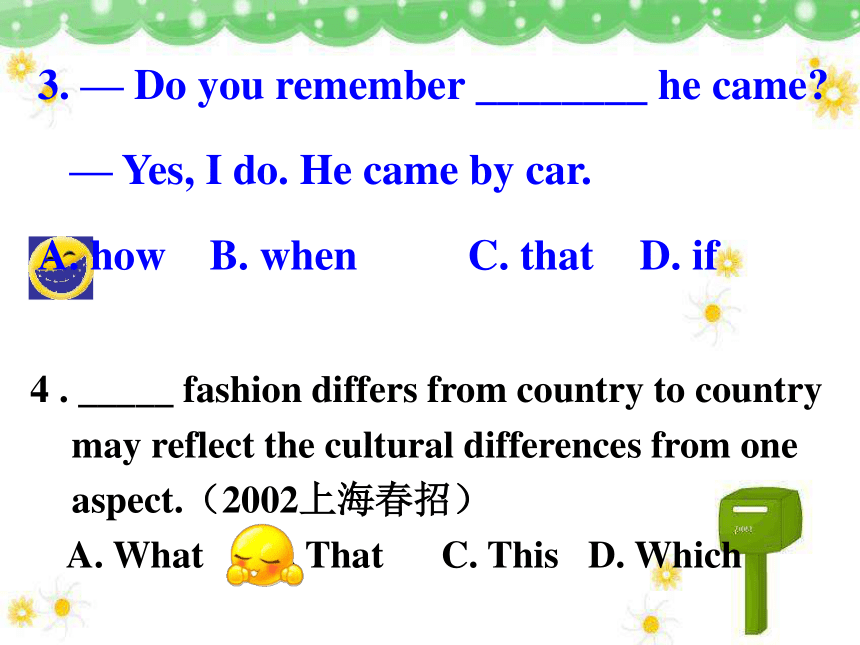
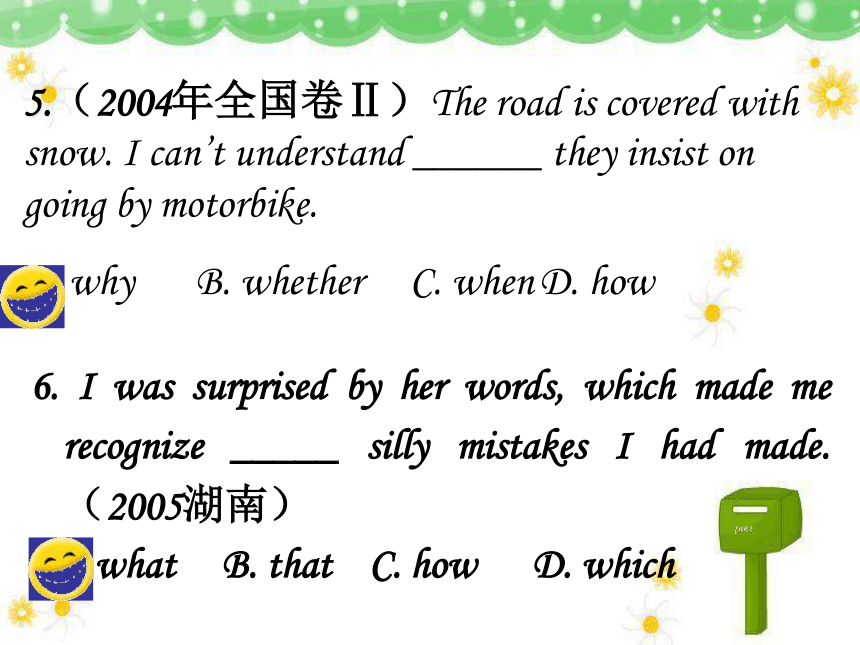


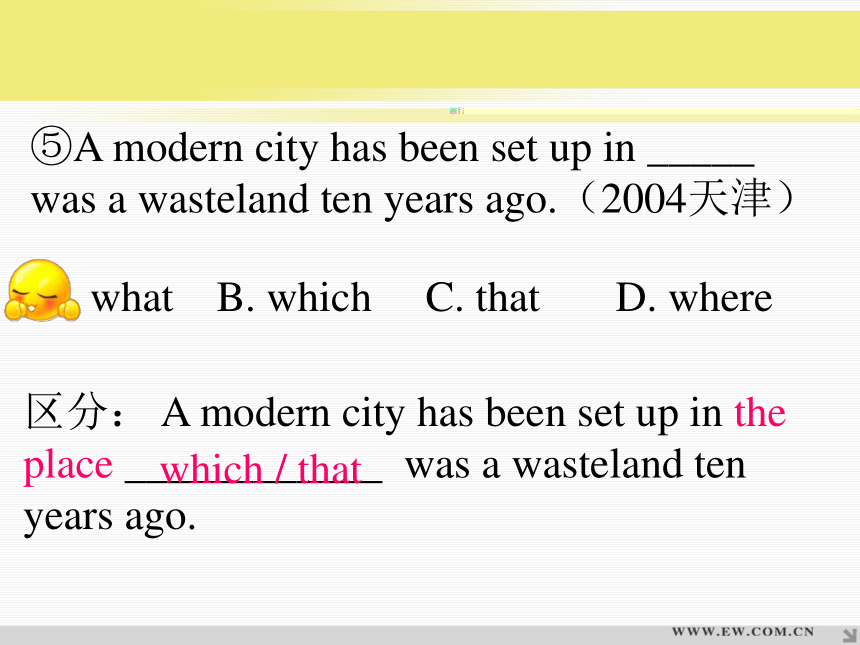

文档简介
(共58张PPT)
复合句的种类
名词性从句
形容词性从句(定语从句)
副词性从句(状语从句)
名词性从句
名词性从句包括主语从句、宾语从句、表语从句和同位语从句.
引导词:
1. 从属连词:that, if , whether
2. 连接代词: who, what, which, whom, whose以及wh-ever
3. 连接副词: when, where, how, why等.
连接代词一般作主语, 宾语、表语和定语
连接副词作时间、地点、方式、原因状语.
所有的引导词都具有连词特征, 除了that在宾语从句中可以省略外, 其他引导词一般不能省略.
表语从句中常见:as if /because
一、正确运用名词性从句的引导词
Ⅰ.判断句子是不是名词性从句
①You should make it a rule to leave things where you can find them again.
②Go and get your coat. It’s where you left it .
③He lives in a small village where there are a lot of trees.
看从句少不少成分
看从句意义是不是完整
Ⅱ.
1. ____ he will attend the meeting is not known yet.
A. Which B. What C. That D. Whether
Practice
2. ______ caused the accident is still a complete mystery.
A. What B. That C. How D. Where
3. — Do you remember ________ he came
— Yes, I do. He came by car.
A. how B. when C. that D. if
4 . _____ fashion differs from country to country may reflect the cultural differences from one aspect.(2002上海春招)
A. What B. That C. This D. Which
5.(2004年全国卷Ⅱ)The road is covered with snow. I can’t understand ______ they insist on going by motorbike.
A. why B. whether C. when D. how
6. I was surprised by her words, which made me recognize _____ silly mistakes I had made. (2005湖南)
A. what B. that C. how D. which
1、what引导名词性从句的含义及用法
2、whether与if引导名词性从句的区别
3、wh-与wh-ever引导名词性从句的区别
4、同位语从句与定语从句的主要区别
5 、其他
1、what引导名词性从句的含义及用法
① What we can't get seems better than what we have.
② What he said at the meeting astonished
everyone present.
③It is pretty well understood what controls the flow
of carbon dioxide in and out the atmosphere today.
④Bob is no longer what he used to be.
⑤A modern city has been set up in _____ was a wasteland ten years ago.(2004天津)
A. what B. which C. that D. where
区分: A modern city has been set up in the place ____________ was a wasteland ten years ago.
which / that
whether还是 if
Eg. ① It depends on ___ he has enough money.
A. if B. weather C. if or not D. whether
② ___ the sports meet will be held depends on the weather.
A. When ever B. If C. Whether D. That
③ I don’t mind ______ they will come.
A. if or not B. whether or not C. whether or no
D. if or no
2、whether与if引导名词性从句的区别
用whether或if引导名词性从句时,
两词引导宾语从句时可以互换, 但下列情况一般只用whether:
a. 介词后的宾语从句;
b. 引导主语从句, 表语从句, 同位语从句;
c. 后面出现or not.
注意:
whether后面出现or not可引导一个让步状语从句表示“不管”、“无论”,而if不能。If表示“如果”时,不能用whether。
Whether he comes or not, we will begin our party on time.
If I have enough time, I will play football.
3、wh-与wh-ever引导名词性从句的区别
What与whatever
⑴ The man isn’t a person to rely on. _____ he said was not true.
⑵ _____ caused the accident is still a complete mystery
A. Whatever B. What C. Which D. That
A
B
①_____ has helped to save the drowning girl is worth praising.
Who B. The one C. Anyone D. Whoever
②It's a matter of _____ would take the position.
A. who B. whoever C. whom D. whomever
比较: ____ has helped to save the drowning girl remains unknown.
A
who与whoever
① Eat ____ cake you like and leave the others for ____ comes in late.
any; who B. every; whoever
C. whichever; whoever D. either; whoever
which与whichever
② There are all kinds of books. We really don”t know _____ to choose.
A. Whichever B. when C. what D. which
whomever 只作宾语;
whatever﹦anything that
whoever ﹦anyone who
whomever ﹦anyone whom
whichever ﹦anyone that( 强调某一范围中的任何一个)
what\who\which + ever和no matter + what\who\which的区别:
①what\who\which + ever可引导名词性从句和让步状语从句Whoever breaks the rule must be punished. Whatever you do, you must do it well.
② no matter + what\who\which只能引导让步状语从句。如: No matter who breaks the rule, he must be punished.
4、that引导的同位语从句与定语从句的区别
从意义上考察
从语法上考察
I told him the news that Mr. Wu would teach us
English this term.
I told him the news that surprised him very much.
(同位语从句)
(定语从句)
注意that在同位语从句和定语从句的区别:
A.定语从句中关系词代替先行词在从句中做成分;而在同位语从句中连接词不做成分。
B.定语从句是对前面名词进行修饰,同位语从句是对前面的名词进行解释说明。
1 The news that our team has won the final match is encouraging.
2 The news that you told us is really encouraging.
同位语从句
同位语从句在句中作某些名词的同位语,这些名词常见的有,fact, news, hope, truth, idea, suggestion, thought, question, order, problem, belief, doubt, fear等。引导同位语从句的连词通常有that和whether, what, why, how…等。
1. She received the message ___ he would
come by plane.
2. She received the message ___ you sent her the other day.
C
D
/ B. which C. that
D. A, B and C
5、名词性从句中it作形式主语和形式宾语
Practice
1. It worried me a bit ______ my hair was turning gray.
A. while B. if C. that D. for
2. It is not yet decided ______ will do the job.
what B. who C. when D. whoever
3. It remains to be proved _______ the plan is feasible.
A.when B.why C.that D.whether
Practice
4. I think it worthwhile _____ we spent so much money on these books.
Why B. what C. whether D. that
5. ____ in the regulations that you should not tell other people the password of your e-mail account.(2005上海) A. What is required B. What requires C. It is required D. It requires
6. _____ is no possibility _____ Bob can win the first prize in the match.
A. There; that B. It; what
C. There; whether D. It; whether
Summary
There is no doubt about …
/that…
There is no possibility that …
There is no need to do …
There is no point (in) doing…
There is no use /
difficulty /
sense /
harm (in) doing …
名词性从句中主句和从句的时态一致、主谓一致、语序
(1) 一个主语从句做主语,谓语动词常用单数:如果由and 连接两个或两个以上的主语从句做主语时,谓语动词用复数;
(2) 由两个或多个连接词引导一个主语从句,谓语动词用单数。如: When the meeting will begin_____not been decided yet.
When they will start and where they go ___not been decided yet.
When and where the meeting will begin ___not been decided.
has
have
has
宾语从句中主句和从句的时态保持一致,但如果从句中表示提示的是客观现象,虽然主句是过去时态,从句仍用一般现在时。如:
The teacher told us that light travels at a very high speed.
.
6.关于doubt
肯定句中doubt后跟if/whether,否定句中doubt后面跟that.
sb. doubts if/whether…..
sb has some doubt whether
sb. doesn’t doubt that …….
There is no doubt that …….
There is no doubt that he will win the game.
定语从句
引导词分为两类:
1. 关系代词: who, whom, whose, which, that, as
2. 关系副词: where, when, why等
引导词的作用:
1. 代替先行词; 2. 引导定语从句;
3. 在从句中充当成分, 关系代词作主语, 宾语(可以省略), 表语; 关系副词作状语.
解题思路:
1.先判断是否是定语从句:
一般结构:先行词(n./pron.)+从句(关系词+其他)
2.判断是非限定性定语从句还是限定性定语从句,若是非限定性定语从句可直接排除that
3.判断关系词或定语从句主谓一致
(1)判断用什么关系词:通过关系词在定语从句中的成分来确定选择关系副词或关系代词.
若关系词在从句中做主语,宾语,表语,定语用关系代词
做状语则用关系副词.
关系代词指人时用:who,whom,that ,whose
指物时用 which,that ,whose
whose=the +n.+ of whom/which
=of whom/which +the +n.
Eg:He is the student whose composition(﹦the composition of whom) won the first prize.
A
B
1.He has a new house _______ window faces south.
2.He has a new house _______the window faces south.
A whose B of which
the
(2)定语从句中主谓一致:定语从句中的谓语动词要与先行词保持一致.
Eg: He gave him some books that ___(be) old.
He gave him a book that ___(be) old.
I, who ___(be) your English teacher, will try my best to help you.
常见考点:
One of +复数名词+关系代词+复数动词
the only one of +复数名词+关系代词+单数动词
1.The Great wall is one of the world-famous building that ____(draw) lots of visitors.
2.The Great wall is the only one of the world-famous building that ____(be) seem from the moon.
which和as 引导非限制性定语从句的区别
定语从句难点
1.在限定性定语从句中,as常放在固定结构中.
So(such) ……as/the same ……as/as ……as
注意区别 1. the same ……as ……和 the same ……that
Eg: This is the same pen as I lost yesterday. 这和我昨天丢失的钢笔是一样的.
This is the same pen that I lost yesterday.这正是我昨天丢失的那枝钢笔.
2.So(such) …….as 和so(such)……that ….的区别
She is so good a student _____ all the teachers like.
She is so good a student _____ all the teachers like her .
2.在非限定性定语从句中:as/which都可引导,但有区别.
1)位置:as位置灵活,主句之前后中都可.
which放在主句之后.
2)意思:as常译为“正如”,which而常译为“这一点”
3)结构:as常放在固定结构中.
As we all know/As is known to all
As anybody can see/As can be seen
As we had expected/As had been expected
As is mentioned above
As has been pointed out
As has been said before
As is often the case with
Eg: The elephant is like a tree, anybody can see.
is mentioned above the number of the students in senior school is increasing.
His father is an engineer, makes him feel very proud.
as
As
which
介词提前的定语从句
介词+which/ whom, 不能用that 或who
如何选用合适的介词:
根据后面动词/形容词和介词的搭配关系选择.
The two things __ ____ they felt proud were Jim’s gold watch and Della’s hair.
应填of which , be proud of 为固定短语.
根据介词与前面的名词搭配选择.
1) Can you find a proper situation __ ____ the expression can be used
2) I’ll never forget the day __ ____ I first met him.
应填in which和on which,
在……场合,介词用in;
表示具体的某一天, 用on.
4. 关系副词引导的定语从句
when, where, why在定语从句中作状语. When →in/ on/ at+which; where→ in/ at+which; why →for which.
I know the reason why (for which) he was unhappy.
This is the house where (in which) we lived for 5 years.
where的用法:当定语从句中缺少状语,而且先行词是situation/case/point//stage/scene,关系副词用where.
Eg:I can think of many cases ____ you know nothing about.
I can think of many cases_____ you told me them before.
总结
选择关系词一定要考虑它在从句中的作用, 即作主语、宾语、表语、定语时用关系代词,作状语时则用关系副词.
I still remember the days which we spent together on the farm.(宾语)
I never forget the days when we worked on the farm.(状语)
He always stayed at the office at 6:00, by which time others had gone home.(定语)
名词从句与定语从句
的主要区别
从句的语序
引导词要放到句首
陈述语序
看从句少不少成分
看从句意义是不是完整
Ⅱ.
成分上的区别:
名词从句和定语从句分别在句中充当什么
样的成分?
1. How the prisoner escaped remains a mystery.
2. I wonder whether/if he is fit for the job.
3. The problem is who will be equal to the task.
4. He had no idea whether we could overcome the
present difficulties or not.
主语
宾语
表语
同位语
结论一:
名词从句充当句子的主要成分;
定于从句充当句子的修饰成分。
2. 引导词含义上的区别:
1. That he came back made us very happy.
2. I’m sorry (that) I’ve made a mistake.
3. As we all know, China is a developing country.
4. This is the village where my father once lived
for several years.
结论二:
定语从句的引导词在语义上
具有指代先行词的作用。
名词从句的引导词不具备此功能。
3. 关于that:
that 在名词从句和定语从句中各起什么作用?
问题:that 作何成分?
结论三:
名词从句中的 that 只起引导词的作用,
无任何意义。
定语从句中的that 在从句中充当主语或宾语,
有时可以与 which 互换。
4. 引导词的不同:
不会出现在名词从句中的关系词:
不会出现在定语从句中的关系词:
as,
但when, where 可以在名词性从句中出现,但不能与 in/on/at which 互换。
whether, if, what, how
5、名词从句与定语从句的一些对应关系:
1. He has done what he can to help me.
--He has done ____ ____ he can to help me.
What I want to say has nothing to do with it.
--____ ____ I want to say has nothing to do
with it.
all that
All that
3. Whoever breaks the law is to be punished.
______ ______ breaks the law is to be punished.
4. He will give the dictionary to whoever needs if most.
He will give the dictionary to ______ ____ needs it most.
5. We’ll remember whomever we turned to for help.
We’ll remember ______ ________ we turned to for help.
6. They will do whatever he wants them to do.
They will do ______ ______he wants them to do.
7. I’ll read whichever book you give me.
I’ll read ____ of the books _____ you give me.
Anyone who
anyone who
Anyone (whom)
anything that
any
that
复合句的种类
名词性从句
形容词性从句(定语从句)
副词性从句(状语从句)
名词性从句
名词性从句包括主语从句、宾语从句、表语从句和同位语从句.
引导词:
1. 从属连词:that, if , whether
2. 连接代词: who, what, which, whom, whose以及wh-ever
3. 连接副词: when, where, how, why等.
连接代词一般作主语, 宾语、表语和定语
连接副词作时间、地点、方式、原因状语.
所有的引导词都具有连词特征, 除了that在宾语从句中可以省略外, 其他引导词一般不能省略.
表语从句中常见:as if /because
一、正确运用名词性从句的引导词
Ⅰ.判断句子是不是名词性从句
①You should make it a rule to leave things where you can find them again.
②Go and get your coat. It’s where you left it .
③He lives in a small village where there are a lot of trees.
看从句少不少成分
看从句意义是不是完整
Ⅱ.
1. ____ he will attend the meeting is not known yet.
A. Which B. What C. That D. Whether
Practice
2. ______ caused the accident is still a complete mystery.
A. What B. That C. How D. Where
3. — Do you remember ________ he came
— Yes, I do. He came by car.
A. how B. when C. that D. if
4 . _____ fashion differs from country to country may reflect the cultural differences from one aspect.(2002上海春招)
A. What B. That C. This D. Which
5.(2004年全国卷Ⅱ)The road is covered with snow. I can’t understand ______ they insist on going by motorbike.
A. why B. whether C. when D. how
6. I was surprised by her words, which made me recognize _____ silly mistakes I had made. (2005湖南)
A. what B. that C. how D. which
1、what引导名词性从句的含义及用法
2、whether与if引导名词性从句的区别
3、wh-与wh-ever引导名词性从句的区别
4、同位语从句与定语从句的主要区别
5 、其他
1、what引导名词性从句的含义及用法
① What we can't get seems better than what we have.
② What he said at the meeting astonished
everyone present.
③It is pretty well understood what controls the flow
of carbon dioxide in and out the atmosphere today.
④Bob is no longer what he used to be.
⑤A modern city has been set up in _____ was a wasteland ten years ago.(2004天津)
A. what B. which C. that D. where
区分: A modern city has been set up in the place ____________ was a wasteland ten years ago.
which / that
whether还是 if
Eg. ① It depends on ___ he has enough money.
A. if B. weather C. if or not D. whether
② ___ the sports meet will be held depends on the weather.
A. When ever B. If C. Whether D. That
③ I don’t mind ______ they will come.
A. if or not B. whether or not C. whether or no
D. if or no
2、whether与if引导名词性从句的区别
用whether或if引导名词性从句时,
两词引导宾语从句时可以互换, 但下列情况一般只用whether:
a. 介词后的宾语从句;
b. 引导主语从句, 表语从句, 同位语从句;
c. 后面出现or not.
注意:
whether后面出现or not可引导一个让步状语从句表示“不管”、“无论”,而if不能。If表示“如果”时,不能用whether。
Whether he comes or not, we will begin our party on time.
If I have enough time, I will play football.
3、wh-与wh-ever引导名词性从句的区别
What与whatever
⑴ The man isn’t a person to rely on. _____ he said was not true.
⑵ _____ caused the accident is still a complete mystery
A. Whatever B. What C. Which D. That
A
B
①_____ has helped to save the drowning girl is worth praising.
Who B. The one C. Anyone D. Whoever
②It's a matter of _____ would take the position.
A. who B. whoever C. whom D. whomever
比较: ____ has helped to save the drowning girl remains unknown.
A
who与whoever
① Eat ____ cake you like and leave the others for ____ comes in late.
any; who B. every; whoever
C. whichever; whoever D. either; whoever
which与whichever
② There are all kinds of books. We really don”t know _____ to choose.
A. Whichever B. when C. what D. which
whomever 只作宾语;
whatever﹦anything that
whoever ﹦anyone who
whomever ﹦anyone whom
whichever ﹦anyone that( 强调某一范围中的任何一个)
what\who\which + ever和no matter + what\who\which的区别:
①what\who\which + ever可引导名词性从句和让步状语从句Whoever breaks the rule must be punished. Whatever you do, you must do it well.
② no matter + what\who\which只能引导让步状语从句。如: No matter who breaks the rule, he must be punished.
4、that引导的同位语从句与定语从句的区别
从意义上考察
从语法上考察
I told him the news that Mr. Wu would teach us
English this term.
I told him the news that surprised him very much.
(同位语从句)
(定语从句)
注意that在同位语从句和定语从句的区别:
A.定语从句中关系词代替先行词在从句中做成分;而在同位语从句中连接词不做成分。
B.定语从句是对前面名词进行修饰,同位语从句是对前面的名词进行解释说明。
1 The news that our team has won the final match is encouraging.
2 The news that you told us is really encouraging.
同位语从句
同位语从句在句中作某些名词的同位语,这些名词常见的有,fact, news, hope, truth, idea, suggestion, thought, question, order, problem, belief, doubt, fear等。引导同位语从句的连词通常有that和whether, what, why, how…等。
1. She received the message ___ he would
come by plane.
2. She received the message ___ you sent her the other day.
C
D
/ B. which C. that
D. A, B and C
5、名词性从句中it作形式主语和形式宾语
Practice
1. It worried me a bit ______ my hair was turning gray.
A. while B. if C. that D. for
2. It is not yet decided ______ will do the job.
what B. who C. when D. whoever
3. It remains to be proved _______ the plan is feasible.
A.when B.why C.that D.whether
Practice
4. I think it worthwhile _____ we spent so much money on these books.
Why B. what C. whether D. that
5. ____ in the regulations that you should not tell other people the password of your e-mail account.(2005上海) A. What is required B. What requires C. It is required D. It requires
6. _____ is no possibility _____ Bob can win the first prize in the match.
A. There; that B. It; what
C. There; whether D. It; whether
Summary
There is no doubt about …
/that…
There is no possibility that …
There is no need to do …
There is no point (in) doing…
There is no use /
difficulty /
sense /
harm (in) doing …
名词性从句中主句和从句的时态一致、主谓一致、语序
(1) 一个主语从句做主语,谓语动词常用单数:如果由and 连接两个或两个以上的主语从句做主语时,谓语动词用复数;
(2) 由两个或多个连接词引导一个主语从句,谓语动词用单数。如: When the meeting will begin_____not been decided yet.
When they will start and where they go ___not been decided yet.
When and where the meeting will begin ___not been decided.
has
have
has
宾语从句中主句和从句的时态保持一致,但如果从句中表示提示的是客观现象,虽然主句是过去时态,从句仍用一般现在时。如:
The teacher told us that light travels at a very high speed.
.
6.关于doubt
肯定句中doubt后跟if/whether,否定句中doubt后面跟that.
sb. doubts if/whether…..
sb has some doubt whether
sb. doesn’t doubt that …….
There is no doubt that …….
There is no doubt that he will win the game.
定语从句
引导词分为两类:
1. 关系代词: who, whom, whose, which, that, as
2. 关系副词: where, when, why等
引导词的作用:
1. 代替先行词; 2. 引导定语从句;
3. 在从句中充当成分, 关系代词作主语, 宾语(可以省略), 表语; 关系副词作状语.
解题思路:
1.先判断是否是定语从句:
一般结构:先行词(n./pron.)+从句(关系词+其他)
2.判断是非限定性定语从句还是限定性定语从句,若是非限定性定语从句可直接排除that
3.判断关系词或定语从句主谓一致
(1)判断用什么关系词:通过关系词在定语从句中的成分来确定选择关系副词或关系代词.
若关系词在从句中做主语,宾语,表语,定语用关系代词
做状语则用关系副词.
关系代词指人时用:who,whom,that ,whose
指物时用 which,that ,whose
whose=the +n.+ of whom/which
=of whom/which +the +n.
Eg:He is the student whose composition(﹦the composition of whom) won the first prize.
A
B
1.He has a new house _______ window faces south.
2.He has a new house _______the window faces south.
A whose B of which
the
(2)定语从句中主谓一致:定语从句中的谓语动词要与先行词保持一致.
Eg: He gave him some books that ___(be) old.
He gave him a book that ___(be) old.
I, who ___(be) your English teacher, will try my best to help you.
常见考点:
One of +复数名词+关系代词+复数动词
the only one of +复数名词+关系代词+单数动词
1.The Great wall is one of the world-famous building that ____(draw) lots of visitors.
2.The Great wall is the only one of the world-famous building that ____(be) seem from the moon.
which和as 引导非限制性定语从句的区别
定语从句难点
1.在限定性定语从句中,as常放在固定结构中.
So(such) ……as/the same ……as/as ……as
注意区别 1. the same ……as ……和 the same ……that
Eg: This is the same pen as I lost yesterday. 这和我昨天丢失的钢笔是一样的.
This is the same pen that I lost yesterday.这正是我昨天丢失的那枝钢笔.
2.So(such) …….as 和so(such)……that ….的区别
She is so good a student _____ all the teachers like.
She is so good a student _____ all the teachers like her .
2.在非限定性定语从句中:as/which都可引导,但有区别.
1)位置:as位置灵活,主句之前后中都可.
which放在主句之后.
2)意思:as常译为“正如”,which而常译为“这一点”
3)结构:as常放在固定结构中.
As we all know/As is known to all
As anybody can see/As can be seen
As we had expected/As had been expected
As is mentioned above
As has been pointed out
As has been said before
As is often the case with
Eg: The elephant is like a tree, anybody can see.
is mentioned above the number of the students in senior school is increasing.
His father is an engineer, makes him feel very proud.
as
As
which
介词提前的定语从句
介词+which/ whom, 不能用that 或who
如何选用合适的介词:
根据后面动词/形容词和介词的搭配关系选择.
The two things __ ____ they felt proud were Jim’s gold watch and Della’s hair.
应填of which , be proud of 为固定短语.
根据介词与前面的名词搭配选择.
1) Can you find a proper situation __ ____ the expression can be used
2) I’ll never forget the day __ ____ I first met him.
应填in which和on which,
在……场合,介词用in;
表示具体的某一天, 用on.
4. 关系副词引导的定语从句
when, where, why在定语从句中作状语. When →in/ on/ at+which; where→ in/ at+which; why →for which.
I know the reason why (for which) he was unhappy.
This is the house where (in which) we lived for 5 years.
where的用法:当定语从句中缺少状语,而且先行词是situation/case/point//stage/scene,关系副词用where.
Eg:I can think of many cases ____ you know nothing about.
I can think of many cases_____ you told me them before.
总结
选择关系词一定要考虑它在从句中的作用, 即作主语、宾语、表语、定语时用关系代词,作状语时则用关系副词.
I still remember the days which we spent together on the farm.(宾语)
I never forget the days when we worked on the farm.(状语)
He always stayed at the office at 6:00, by which time others had gone home.(定语)
名词从句与定语从句
的主要区别
从句的语序
引导词要放到句首
陈述语序
看从句少不少成分
看从句意义是不是完整
Ⅱ.
成分上的区别:
名词从句和定语从句分别在句中充当什么
样的成分?
1. How the prisoner escaped remains a mystery.
2. I wonder whether/if he is fit for the job.
3. The problem is who will be equal to the task.
4. He had no idea whether we could overcome the
present difficulties or not.
主语
宾语
表语
同位语
结论一:
名词从句充当句子的主要成分;
定于从句充当句子的修饰成分。
2. 引导词含义上的区别:
1. That he came back made us very happy.
2. I’m sorry (that) I’ve made a mistake.
3. As we all know, China is a developing country.
4. This is the village where my father once lived
for several years.
结论二:
定语从句的引导词在语义上
具有指代先行词的作用。
名词从句的引导词不具备此功能。
3. 关于that:
that 在名词从句和定语从句中各起什么作用?
问题:that 作何成分?
结论三:
名词从句中的 that 只起引导词的作用,
无任何意义。
定语从句中的that 在从句中充当主语或宾语,
有时可以与 which 互换。
4. 引导词的不同:
不会出现在名词从句中的关系词:
不会出现在定语从句中的关系词:
as,
但when, where 可以在名词性从句中出现,但不能与 in/on/at which 互换。
whether, if, what, how
5、名词从句与定语从句的一些对应关系:
1. He has done what he can to help me.
--He has done ____ ____ he can to help me.
What I want to say has nothing to do with it.
--____ ____ I want to say has nothing to do
with it.
all that
All that
3. Whoever breaks the law is to be punished.
______ ______ breaks the law is to be punished.
4. He will give the dictionary to whoever needs if most.
He will give the dictionary to ______ ____ needs it most.
5. We’ll remember whomever we turned to for help.
We’ll remember ______ ________ we turned to for help.
6. They will do whatever he wants them to do.
They will do ______ ______he wants them to do.
7. I’ll read whichever book you give me.
I’ll read ____ of the books _____ you give me.
Anyone who
anyone who
Anyone (whom)
anything that
any
that
